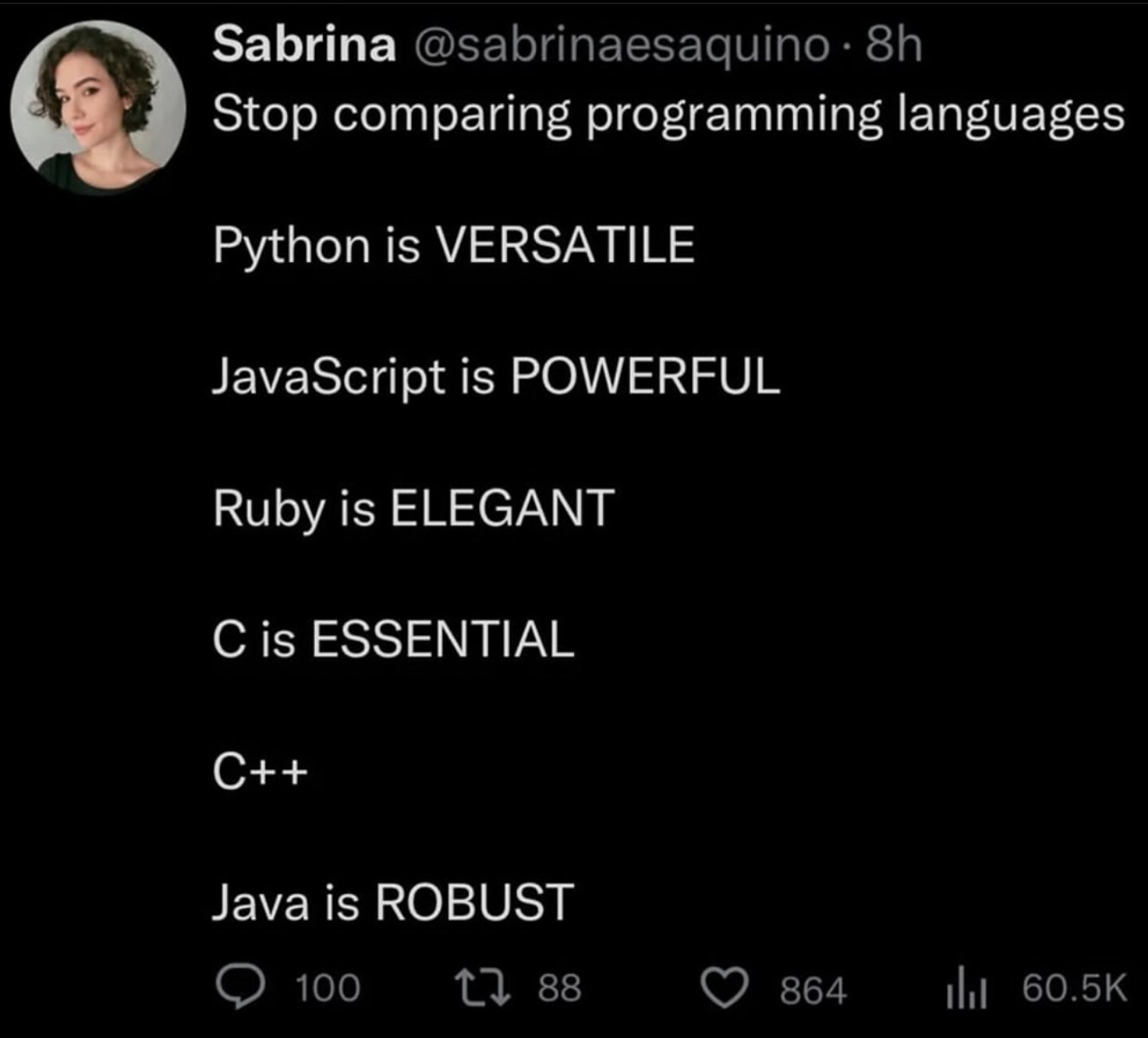this post was submitted on 14 Jun 2024
673 points (93.0% liked)
Programmer Humor
19623 readers
411 users here now
Welcome to Programmer Humor!
This is a place where you can post jokes, memes, humor, etc. related to programming!
For sharing awful code theres also Programming Horror.
Rules
- Keep content in english
- No advertisements
- Posts must be related to programming or programmer topics
founded 1 year ago
MODERATORS
you are viewing a single comment's thread
view the rest of the comments
view the rest of the comments

I agree that the slow compile times are pretty bad (maybe even deal-breakingly for large projects). I think it's kind of necessary for a language with as powerful of a syntax as Scala though, it's pretty absurd how expressive you can get. Maybe if it didn't target the JVM, it'd be able to achieve way faster compile times – I don't really see a point of even targeting JVM other than for library access (not to say that that isn't a huge benefit), especially when it has relatively poor compatibility with other JVM languages and it's nearly impossible to use for Android (don't try this at home).
Even more so, I think that null handling isn't nice – I wish it were more similar to Kotlin's. One thing I'm really confused as to why Scala didn't go all-in on is Either/Result like in Rust. Types like that exist, but Scala seems to mostly just encourages you to use exceptions for error propogation/handling rather than returning a Monad.
A more minor grudge I have is just the high-level primitive types in general – it's pretty annoying not being able to specify unsigned integers or certain byte-width types by default, but if it really is an issue than it can be worked around. Also things like mutable pointers/references – I don't actually know if you can do those in Scala... I've had many situations where it'd be useful to have such a thing. But that's mostly because I was probably using Scala for things it's not as cut out to do.
With the tuple arguments point, I get it but I haven't found it much of an issue. I do wish it wasn't that way and it consistently distinguished between a tuple and an argument list though, either that or make functions take arguments without tuples like in other functional languages or CLI languages (but that'd probably screw a lot of stuff up and make compile times even LONGER). I saw someone on r/ProgrammingLanguages a while back express how their language used commas/delimiters without any brackets to express an argument list.
I think an actually "perfect" language to me would basically just be Rust but with a bunch of the features that Scala adds – of course the significant functional aspect that Scala has (and the clearly superior lambda syntax), but also the significantly more powerful traits and OOP/OOP-like polymorphism. Scala is the only language that I can say I don't feel anxious liberally using inheritance in, in fact I use inheritance in it constantly and I enjoy it. Scala's "enum"/variant inheritance pattern is like Rust enums, but on crack. Obviously, Rust would never get inheritance, but I've found myself in multiple situations where I'm thinking "damn, it's annoying that I have to treat and as almost completely serparate". It would especially be nice in certain situations with const generic traits that are basically variants of each other.
Plus, I've always personally liked function overloading and default arguments and variadics/variadic generics and stuff, but the Rust community generally seems to be against the former 2. I just really hate there being a hundred functions, all a sea of underscores and adjectives, that are basically the same thing but take different numbers of arguments or slightly different arguments.
The custom operators are a double-edged sword, I love them and always use them, but at the same time it can be unclear as to what they do without digging into documentation. I guess Haskell has a similar problem though, but I don't think Scala allows you to specify operator precedence like Haskell does and it just relies on the first character's precedence. I would still want them though.
How it goes now, though, is I use Scala 3 for project design/prototyping, scripting, and less performance-sensitive projects, and Rust for pretty much everything else (and anything involving graphics or web). Scala has good linear algebra tooling, but honestly I'll usually use C++ or Python for that most of the time because they have better tooling (and possibly better performance). I would say R too, but matplotlib has completely replaced it for literally everything regarding math for me.
Sounds like we're actually in agreement about most of this.
I'm okay with languages limiting their "expressive" power in order to provide stronger correctness guarantees or just limit how "weird" code looks; but this is largely because I've worked on many projects where someone had written a heap of difficult-to-understand code, and I doubt such limitations would be appealing if I were working strictly on my own.
I also don't really see the appeal of Java-style inheritance, but to be honest I didn't use Scala for long enough to know whether or not I agree that Scala does inheritance "right".
It does make sense that Rust provides mutability in some cases where Scala doesn't. Rust's superpower, enabled by the borrow checker, is effectively "safe mutability." I hope other, simpler languages build on this invention.